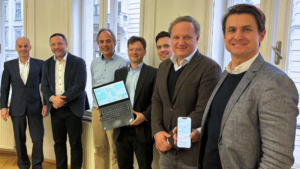AI in politics: Ex-Angela Merkel advisor Juri Schnöller on agile democracy

The German political consultant and campaign expert Juri Schnöller believes we need to rethink democracy. His research shows that only 8% of the world’s population lives in a fully functioning democracy. Yet many useful AI tools could restore citizens’ trust in political decision-makers and even revolutionize the electoral process. Schnöller founded the political and digital communications consultancy “Cosmonauts & Kings” and the “Mutrepublik”. He is also behind the non-profit organization “AI4Democracy“.
Trending Topics: What is the non-profit impact alliance “AI4Democracy” about?
Juri Schnöller: We were driven by the question of how AI can be used to improve democracy and strengthen the common good. This involves many of the problems of recent years that are being addressed primarily by populist or extremist forces. For example, politics as a process is very slow and no longer able to solve problems appropriately. People have the feeling that politics is far away and no longer reflects their needs properly. The AI4Democracy platform is intended to bring together different civil society actors and organizations and work on precisely this question. It is about finding answers to the question of how AI can be used not only to generate profit but also to solve social problems for the common good.
Your new book “Agile Democracy: How Artificial Intelligence Enables Better Politics” was recently published. What motivated you to write this book?
What particularly bothered me was that most books I came across presented AI in a very risky and frightening scenario – as the Terminator AI that will wipe us all out. It was important to me to make a constructive contribution to the debate. That’s why I looked at which countries we can learn something positive about AI from. The Baltic states, but also Taiwan and Singapore, for example, are already more advanced than Germany in terms of technology.
In the end, it must be possible to see technology as an opportunity to make our system, our democracy, our structures, our procedures and processes better, more efficient, and ultimately more agile. So that people regain more trust in democracy and our system. It is really important not to have a romanticized or naive view of AI, but one that is aware of the risks.
According to the Economist Intelligence Unit’s Democracy Index, only eight percent of the world’s population currently live in a fully functioning democracy.* Why is that, and what accounts for the other 37 percent who live in a flawed democracy?
Of course, there are countries, especially in Europe or North America, that meet most of the criteria of a democracy. But when we talk about “flawed democracies”, we also include Hungary and many African countries. There is freedom of choice, but freedom of expression is still partially restricted. It could also be more difficult to found a new party or work as an independent election observer. We are dealing here with fluid shades of grey, all the way up to autocratic systems.
The main issues are freedom, media access, and freedom of information. Only a few countries now meet the ideal type of absolutely free liberal democracy. Historically speaking, autocratic or totalitarian regimes have been on the rise again in the last 20 years. And now, with new technologies, they also have completely different means at their disposal. A look at China shows us the extent of surveillance and media control. Russia has also gained even more control through such measures.
Where would you place Austria and Germany?
Of course, in our opinion, they are free and liberal democracies. But the same applies to Austria and Germany: populism is currently growing stronger and there are no signs that it can be pushed back. In Austria in particular, there have been many domestic political crises in recent years, for example in relation to the intertwining of politics and the media. But the situation is similar in Germany. You only have to take a look at the supervisory boards of public broadcasters.

A brief overview of AI. What do citizens in Germany and Austria think about the topic?
For the book, the market and opinion research institute “Civey” conducted surveys and found that if you ask people about AI in a very abstract way, fears and worries tend to predominate. But as soon as you ask them whether they would like it if AI drastically reduced waiting times for visits to authorities or introduced a predictive warning system early on in the event of natural disasters, the majority voted in favor of AI. I believe that the key task – not just for politics, but also for society and the economy – is to make AI tangible and tactilely understandable for people. As far as politics is concerned, we are honestly in the so-called exploration phase, where politicians and their teams are testing various AI tools.
How can various AI applications contribute to communication, fairness, and trust between politics and society? Do you have any examples?
For example, AI tools can enable citizens to participate in political decisions. In Germany, the energy transition is a very big issue. Wind farms are needed in many rural regions. People have to be taken along with such major transformations. You have to think about what the path could look like that involves citizens. AI can help to moderate, vote, and gather sentiment much better. This approach can be incorporated into a process and at the same time bring efficiency so that discussions don’t die. The topic of participation is also a big one. Doesn’t it perhaps make sense to let citizens have some say in which offers the public broadcasting money goes to? You could ask them what educational offerings they want. “Down the line“ in the next few years will show what is more attractive: authoritarian systems like China, Russia, or Turkey, or a counter-model of Western democracy that uses technology to give people more freedom and participation.
In your book, you mention the smart democracy assistant. What is it and what can it be used for?
This is about local self-government. The smart democracy assistant would be an AI assistant that supports local mayors by analyzing relevant data on population development, traffic routes, visitor numbers, and more. This enables better, evidence-based decisions to be made in order to achieve a more intelligent integration of organizations, civil society, and the state. Municipalities in particular could work more efficiently despite resource scarcity by quickly informing people about current developments such as drinking water contamination. AI is not intended to replace people, but to relieve them so that they can concentrate on essential tasks. With its help, for example, one could answer where the new swimming pool should be built or where new kindergartens are needed.
Is it realistic to support the entire election process with AI?
There are already great tools, such as the Wahl-O-Mat. You can enter lots of questions into it and it will then show you which party matches your interests. AI can help here too. Let’s say a 30-year-old trained craftsman with two children is interested in certain issues. He could be presented with personalized and individualized party program points that are geared to his needs. In the future, chatbots that enable interactions with MPs or parties are also conceivable. These models would have to be trained by parties to match political preferences. AI would thus enable voters to be addressed more individually and the decision-making process to be personalized.
What else would be part of an agile democracy in a utopian scenario?
If we really took a more participatory approach in which citizens could participate to a large extent in the legislative process, there would be much more evidence-based, better data as a basis for decision-making. It would not just be about balancing the interests of particular groups. A revolutionary approach would be an individual tax rate that is based on living needs, instead of rigidly dividing people into tax brackets. For example, the tax rate could adjust automatically when you have a child, look after relatives who need care or engage in social activities. This flexible adjustment would be more agile and effective than deducting taxes retroactively via your tax return.
What is your vision of the ideal democracy in three to five years?
I want a democracy that learns from its mistakes and continues to develop. It would be an insult to our children and grandchildren if we now say that we have reached the flagpole and that democracy will always remain where we are now. That would not only be naive, it would be arrogant. I hope that AI can provide an impetus so that we can all work together to continue writing the history of democracy. This is the only way we can prevent it from falling victim to the populists.
*In the Economist Intelligence Unit 2023 Democracy Index ranking, Norway, Iceland, Sweden, Finland, Denmark, Ireland, Switzerland, and New Zealand have the highest ranking and are therefore considered fully functioning democracies.
Disclaimer: This interview is translated from German.





























